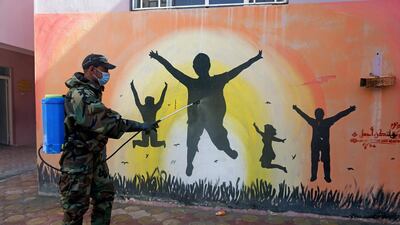Western leaders have praised Iraqi efforts to tackle economic and coronavirus crises and are backing supporting reforms they say could be "transformative".
In a statement released on Saturday, the Iraq Economic Contact Group (IECG), said the economic agenda contained in a new White Paper could create "lasting opportunities" for Iraqis.
The meeting of the Iraq Economic Contact Group, made up of Canada, the EU, the UK, France, Germany, Italy, Japan, Saudi Arabia, the US and the World Bank, comes as international organisations look at ways to get out of the crisis caused by the pandemic.
For Iraq, though, it also has to boost its transparency and prosperity while the oil market is in the doldrums.
"Iraq faces daunting economic and fiscal challenges amplified by the twin crises of Covid-19 and the oil market," the IECG said.
"We commend the government of Iraq for having set out an ambitious reform agenda to protect the most vulnerable, investing effectively for human capital and infrastructure, diversifying the economy and enabling the private sector," it added.
The reforms, as envisioned, come with transparency and accountability that could mean a prosperous future for Iraq, the contact group said.
"Decisive and swift action to bring about the much-needed transformative change is required … We stand ready to support the government of Iraq in delivering these reforms, not only to ward off crisis but to create lasting opportunities for the Iraqi people," the statement read.
Iraq's economy shrank by almost 11 per cent in 2020 due to the pandemic and oil revenue declines but the International Monetary Fund (IMF) has projected a return to its pre-pandemic level by 2024.
The slowdown in the real gross domestic product reflects a drop in non-oil activity and reductions in oil output as a result of Opec+ decisions, the fund said.
The IMF has stressed up on the importance of reducing corruption in key public institutions and restructuring of large state-owned banks to foster financial stability and developing the private sector.
Iraq, Opec's second-largest oil producer, is highly reliant on oil revenue to foot 90 per cent of government expenditure, including $5 billion spent on salaries for public servants each month.
The IMF also cautioned that political constraints before the parliamentary elections and renewed bouts of social unrest could undermine the reform efforts.


